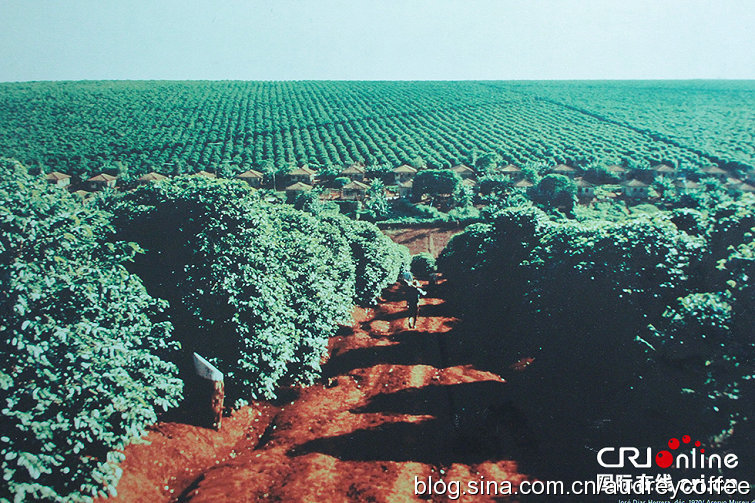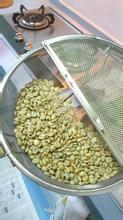Take you to a coffee farm in Brazil to learn about coffee beans.
Brazil is the largest coffee producer and the second largest coffee consumer in the world. In Brazil, wherever you go, you can have coffee in the morning or at night.

Unlike the Italian concentrate, or latte or cappuccino, as most of us know, what Brazilians like most is the kind of ordinary coffee in a small cup, which is hot and mellow. What you can't imagine is how many cups of coffee Brazilians drink a day. When you ask a Brazilian on the street, no matter how old he is, he will tell you, "my day must begin with coffee and end with coffee." Drink with hot water whenever you want, basically 7 small cups a day, sometimes more. "
It is this brown grain that has always determined the trade balance of Brazil as a whole. However, coffee is not a product of Brazil, but also an "immigrant". Coffee originated in Ethiopia, and after that, coffee trees and seeds were brought to French Guinea and closely guarded as trade secrets. However, in 1727, Francesco Paletta, a Portuguese captain from Brazil, captured the heart of the then governor's wife in Cayenne, the capital of French Guinea, and succeeded in bringing coffee seeds from Africa to Brazil. Since then, coffee has adapted rapidly in Brazil, spreading from the north to the southeastern state of Sao Paulo. By 1845, Brazil had produced 45% of the world's coffee beans and had become the main source of income in the state of Sao Paulo. The Coffee Museum in Santos, Sao Paulo, formerly a coffee exchange, was built in the early 20th century, with stained glass windows and marble floors like a luxurious baroque palace. Marilia, executive director of the museum, said: "this is an exchange that specializes in coffee trading. For more than 40 years, coffee has been the main source of income for Brazil, especially the state of Sao Paulo." When you see this monumental building, so magnificent, it shows the wealth that coffee brings to Brazil, especially during that time, coffee led to industrial development and railway construction in Brazil, and brought new habits and culture to Brazil. "
In Brazil, coffee farms occupy almost all the valleys in the southeastern states of Sao Paulo, Minas, Saint Ling and Parana, and the harvest or reduction of Brazilian coffee can always have a direct impact on the global market. However, the export of Brazilian coffee is not as simple as bagging coffee and carrying it on board. Santos Port is the largest coffee export port in Brazil and even in the world. Brazilian coffee ranchers and middlemen gather in the exchange every year. Brazilian coffee has always been dominated by the export of raw beans. Its pricing is carried out here in a form similar to an auction. Marilia said: "in the past, a chairman sat in the main seat in this hall and began to announce bids. For example, the coffee quality of Jose Simouson, the owner of the estate, was so-and-so, and all coffee used to be marked by grade. Then middleman A will say how much my buyer quotes, middleman B may say,'my buyer offers a higher price, 'and so on, just like bidding. "
After the price was set, the coffee beans were transported by train or truck to the port of Santos, where workers had to pick and pack the beans and put bags of coffee beans on ships around the world. At that time, the labor force was cheap, and in order to catch the freighter that would leave port in the morning, they all had to work all night, an old man recalled.
When the reporter visited the coffee history of Brazil, labor, income, wealth. Economic benefits are the most heard content. On the cultural heritage of Brazilian coffee, and even coffee quality brands, coffee production technology and so on are rare, Marilia explained: "in Brazil, many people will say that coffee is the achievement of Brazil, Brazil is the coffee kingdom, and we want to show you, from the farmers on the farm, to the workers in the port, to the coffee appraisers and exporters in Santos, the economic effects of these coffee." At the same time, it has also changed our architectural history, literary history, art history, the history of coffee is closely related to the lives of Brazilians, but they do not realize that this is a property that needs our protection. "
To make Brazilians better understand coffee, changing drinking habits is the most direct way. Barista Harrison, who has been in the industry for eight years, told reporters that in the past, Brazilians used to drink coffee of poor quality and bitter taste, so Brazilians like to put a lot of sugar in their coffee, but now it is slowly changing. "Today, people know more about coffee," he said. There is more and more information about coffee, and people have the opportunity to learn about it. For example, we will introduce the differences of all kinds of coffee in museum cafes, Santos or other cities, so that you can try to taste the original taste of unsweetened coffee. "
The impact of coffee on Brazil and its people has never abated, and Brazil now leads the world in terms of coffee production, accounting for 32% of the world's production. And a new generation of Brazilians still love this brown-and-black drink. Harrison's son is just over two years old and has already started drinking black coffee made for him by his father. "my son has been drinking coffee since he was more than two years old, and he likes it very much. I will add some sugar to him, but he can also drink pure black coffee without sugar, just like drinking juice."
.
[source: international online]
Important Notice :
前街咖啡 FrontStreet Coffee has moved to new addredd:
FrontStreet Coffee Address: 315,Donghua East Road,GuangZhou
Tel:020 38364473
- Prev

Frying coffee beans by hand allows you to master the skills of do-it-yourself baking
First, prepare 100 grams of raw coffee beans, if there are broken coffee beans, remove them. Then put the raw coffee beans in the filter, close the lid, open the gas to medium fire, hold the filter about 20-30 centimeters above the gas, swing it in a round way, and bake patiently. At first, it may not be easy, but after you get used to it, you can skillfully increase it according to your own preferences.
- Next

Utensils for roasting coffee beans and the roasting process of coffee beans
Coffee roasted Coffee Roasting coffee is popular mainly because of the aroma formed after roasting and the taste when drinking. The coffee raw bean itself does not have any special taste, it is roasted to completely change and reorganize the substances inside the raw bean to form a new structure, thus bringing out the mellow flavor of the coffee. Baking tool roaster, divided into three types: direct fire type, semi-hot air straight
Related
- Guji coffee producing area of Guji, Ethiopia: Humbela, Shakiso, Wulaga
- What is the most expensive variety of Qiloso in BOP multi-variety group?
- How to store the coffee beans bought home?
- Why are Yemeni coffee beans so rare now?
- Ethiopian Sidamo all Red Fruit Sun Sun Santa Vini Coffee beans
- SOE is mostly sour? What does it mean? Is it a single bean? what's the difference between it and Italian blending?
- Is Italian coffee beans suitable for making hand-brewed coffee?
- How to choose coffee beans when making cold coffee? What kind of coffee beans are suitable for making cold coffee?
- Just entered the pit to make coffee, what kind of coffee beans should be chosen?
- Can only Japan buy real Blue Mountain Coffee? What are authentic Jamaican Blue Mountain coffee beans?

